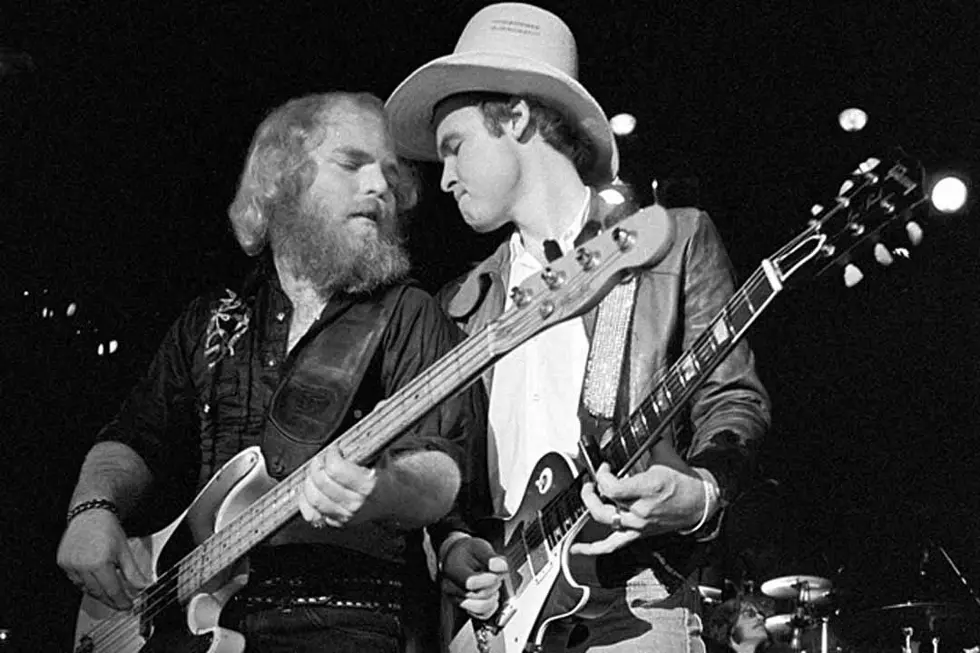
50 Years Ago: ZZ Top Pilfer ‘Francine’ for First Charting Song
The pre-bearded ZZ Top's second album, Rio Grande Mud, arrived on April 4, 1972, at the beginning of their climb to global success. Already, they were shrouded in controversy – perhaps no surprise, considering the character who assisted that rise.
Manager and “fourth member” Bill Ham was an impresario in the style of P.T. Barnum and other circus giants of old. He believed in doing whatever it took to secure top billing, confident that the musicians would deliver such a powerful performance once they got on stage that any tall stories he’d told to get them there would be quickly forgotten.
Those who worked with or for Ham on the business side had become accustomed to his deliberately obtuse ways: He was known for walking out of meetings just as a deal was done and refusing to be contacted for days afterward or launching ZZ Top’s “first annual” barbecue and rock show event even though he was reasonably certain there would be no second edition.
Along the way, if Ham decided it was time for a deal to change, he'd change it without regard for the other party’s position. That could be why the two cowriters of “Francine” – the second LP’s only single and ZZ Top’s first charting hit – spent so many years without a writing credit or royalties.
Steve Perron and Kenny Cordray collaborated with ZZ Top guitarist Billy Gibbons on the song, aiming to achieve a Rolling Stones-like vibe without removing what was becoming the band’s trademark Texan element. The closing section is, in fact, a lift from the Stones’ “Brown Sugar.”
“‘Francine’ was written with a guy who’s dead now, Steve Perron, who was a great writer. He loved the Stones, and that was his tag at the end,” Gibbons told Guitar World in 2009. “It was kind of unintentional at the time. It’s not like these sounds haven’t been done before. It just took somebody like ZZ Top to come along and put them in their proper perspective.”
Another problem – more so now than then, and notably, one that's shared with “Brown Sugar” – was the presence of potentially inappropriate lyrics, as sung by bassist Dusty Hill.
Listen to ZZ Top's 'Francine'
Francine, a girl the narrator is completely in love with, is only 13, according to the lyrics. While at first glance it’s suggestive, there are reasons why Gibbons, as songwriter, might not want to change it.
For one, it’s not certain that the narrator is Gibbons himself. For another, the song is a classic example of a teen-angst track, popularized a decade and a half before “Francine” was written. As an example of a moment in time, changing the word “13” to “18” or “19” (as some tribute bands are known to do) isn’t necessary. Perhaps it’s simply something Gibbons saw as an observer while the band slowly built their reputation – and their songbook.
Rio Grande Mud “was the first record that brought us into step with the writing experience,” Gibbons told Music Radar in 2013. “We started documenting events as they happened to us on the road. All of these elements went into the songwriting notebook. As we went along, we were keeping track of skeleton ideas as they popped up. The craft was certainly developing.”
It certainly didn’t seem to bother Ham, who produced the recording sessions: The word “13” remains in the 2019 remaster. Perron and Cordray’s credits, however, have since been rightly reinstated.
In keeping with ZZ Top’s (and Ham’s) aim of popularizing Texan culture, the B-side of the single was the same song, with the lyrics delivered in Spanish. While the song reached only No. 69 on release and is often titled “Francene,” it proved to be a line in the sand for Gibbons, Hill and drummer Frank Beard: Their next single, “La Grange,” was an even bigger step up.
For Gibbons, though, the first hit retains a place in his heart. “Another fond recollection that springs to mind was hearing one of our first records, ‘Francine,’ coming in very faintly on an AM station as we were driving to a gig out in far West Texas,” he told the Austin American-Statesman in 2019.
“Although we were cruising through a desolate stretch of desert, we slowed to a crawl as to not lose the signal,” Gibbons added. “Lo and behold, we got stopped out of nowhere and were about to be ticketed for grinding underspeed 'til the patrolman leaned in and heard the song. He grinned and let us go. One of our earliest devoted followers!”
Top 25 Southern Rock Albums
Check Out Billy Gibbons’ Guitar Hero Yearbook Picture


